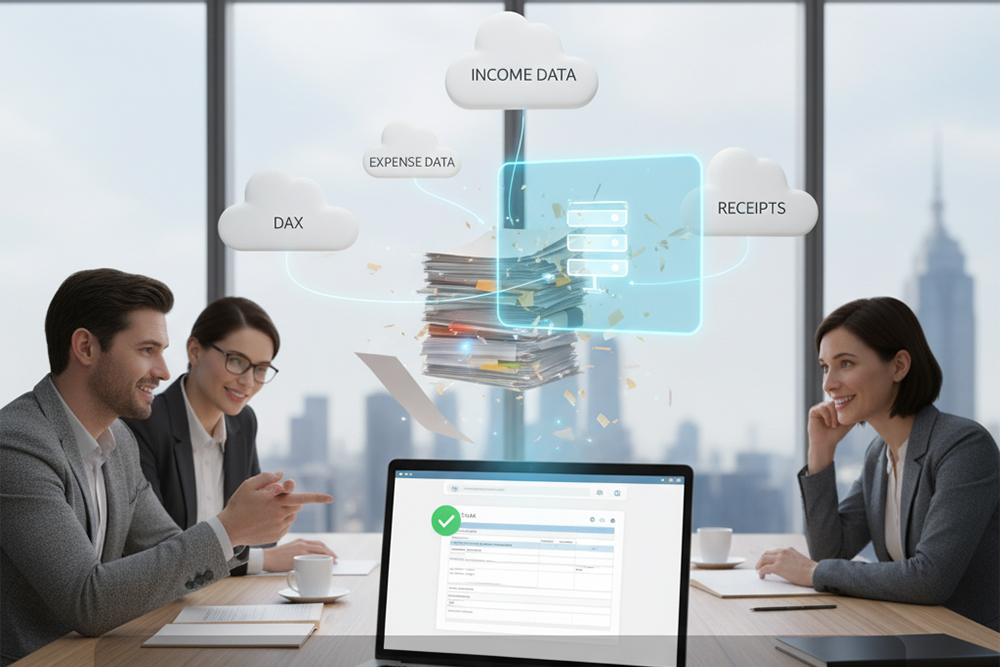For Canadian businesses, tax season is often met with stress, piles of paperwork, and the constant fear of making a costly error. Traditional accounting methods, while once the norm, are no longer efficient in today’s fast-paced digital economy. Fortunately, modern solutions like cloud accounting systems have completely transformed the way companies manage their finances and approach tax obligations.
With powerful tax filing software now widely available, businesses can streamline bookkeeping, stay compliant, and file taxes faster and with greater accuracy.
In this article, we’ll explore how cloud accounting benefits businesses, its role in online bookkeeping, and why it has become essential for smooth CRA reporting in Canada.
The Shift Toward Cloud-Based Accounting
Not long ago, accounting was mostly paper-driven. Businesses relied on spreadsheets, ledgers, and desktop software, all of which made collaboration difficult and data prone to errors. Cloud accounting has changed this landscape completely.
Instead of installing software on a single computer, cloud-based platforms host financial data securely online. This means accountants, business owners, and even auditors can access the same real-time information from anywhere—whether at the office, at home, or on the go.
This accessibility is a game-changer for tax season. With instant access to invoices, expense records, and payroll data, preparing accurate returns using tax filing software in Canada has never been easier.
Cloud Accounting Benefits for Tax Filing
1. Real-Time Data Access
One of the biggest cloud accounting benefits is real-time access to financial records. Tax season no longer requires hours of digging through old receipts or manually updating spreadsheets. Every transaction, from sales to expenses, is automatically logged and categorized in the system.
This ensures that when it’s time to use tax filing software in Canada, the numbers are already up-to-date and accurate, reducing the stress of year-end reconciliations.
2. Reduced Paperwork
Paper clutter is a common frustration during tax preparation. Cloud accounting digitizes receipts, invoices, and records, making them easily searchable and retrievable. No more losing critical documents or scrambling at the last minute.
3. Collaboration Made Easy
Cloud systems allow multiple users to log in simultaneously. Business owners can give their accountants direct access, eliminating the need for endless email exchanges. This transparency not only saves time but also ensures errors are caught early.
Online Bookkeeping for Better Organization
Tax filing requires well-organized financial data. This is where online bookkeeping plays a crucial role. Cloud accounting platforms provide automated bookkeeping services that track income, expenses, and even payroll in a central dashboard.
By using online systems, businesses can:
-
Generate automatic reports on profit and loss.
-
Track deductible expenses throughout the year.
-
Sync bank feeds directly with the accounting software.
These features ensure that all financial records align with CRA requirements, which greatly simplifies CRA reporting in Canada at year-end.
Integrating Tax Filing Software Canada
Modern cloud accounting platforms often integrate seamlessly with tax filing software in Canada, giving businesses a direct path to submitting tax returns. For example, many systems link with CRA’s digital services, enabling electronic filing in just a few clicks.
This integration provides multiple advantages:
-
Faster Processing: Returns can be filed instantly without waiting for the mail.
-
Error Reduction: Automated checks help flag missing fields or inconsistencies before submission.
-
Audit Preparedness: In case the CRA requests clarification, detailed digital records are already stored in the system.
By reducing manual data entry, cloud platforms eliminate one of the biggest sources of tax filing errors.
CRA Reporting Canada Made Simple
Canadian businesses are required to comply with detailed tax obligations, from GST/HST reporting to payroll deductions. Failure to submit accurate reports to the CRA can result in penalties.
Cloud accounting platforms help businesses stay compliant with CRA reporting in Canada by:
-
Automatically calculating GST/HST owed on sales.
-
Keeping track of payroll deductions such as CPP and EI.
-
Generating tax-ready financial statements.
Most platforms even offer reminders for filing deadlines, ensuring businesses never miss critical dates. For small businesses without a full-time accountant, this automation is invaluable.
Security and Reliability
For many business owners, storing sensitive financial data online may raise concerns. However, modern cloud accounting solutions employ enterprise-grade security, including encryption, multi-factor authentication, and secure backup systems.
Compared to desktop software that may be vulnerable to hardware crashes or theft, cloud platforms ensure financial data is protected and recoverable at all times. This is particularly important when filing taxes through tax filing software in Canada, as sensitive personal and business information is involved.
Cost Savings Through Efficiency
Another overlooked advantage of cloud accounting is its cost efficiency. Traditional tax filing often involves hiring additional staff or outsourcing tasks at premium rates due to the volume of work. With automated systems, much of the workload is reduced.
Businesses save money by:
-
Minimizing bookkeeping hours.
-
Reducing errors that could lead to CRA penalties.
-
Avoiding costly last-minute accounting services.
The long-term savings invest in cloud systems worthwhile, especially during tax season.
Scalability for Growing Businesses
As businesses grow, their tax obligations become more complex. Cloud platforms are designed to scale alongside that growth. Whether a company is a sole proprietorship or a mid-sized enterprise, the same system can handle increasing transaction volumes, multiple users, and even multi-currency operations.
This scalability ensures that as businesses expand, they won’t need to switch to entirely new systems. Tax filing remains smooth and consistent regardless of growth.
Case Example: Small Business Transformation
Consider a small retail business that previously relied on manual bookkeeping. Every tax season, the owner spent weeks gathering receipts, tallying sales, and working with an accountant to prepare returns. Mistakes often resulted in reassessments from the CRA.
After switching to cloud accounting, the business:
-
Synced its sales system with the accounting platform.
-
Digitized receipts using a mobile app.
-
Provided the accountant with live access for year-round oversight.
When tax season arrived, the tax filing software Canada integration allowed them to file within hours. No late nights, no missing paperwork, and no penalties.
This example illustrates how cloud accounting is not just a convenience but a critical upgrade for modern businesses.
Preparing for the Future of Tax Filing
As digital transformation continues across industries, the CRA is also embracing technology. More reporting will be streamlined through online platforms, and businesses that adopt cloud accounting early will be well ahead of the curve. Emerging technologies like AI-driven insights may soon automate even more aspects of tax preparation, including forecasting tax liabilities and identifying deductible expenses in real-time. Businesses that leverage cloud accounting benefits now will be better positioned for these future innovations.
Conclusion
The days of shoeboxes full of receipts and stressful, last-minute tax filing are fading fast. Cloud accounting has redefined how Canadian businesses prepare for tax season, offering automation, accuracy, and peace of mind.
By combining online bookkeeping with powerful tax filing software in Canada, businesses can simplify CRA reporting in Canada, reduce errors, and save valuable time. Beyond tax season, cloud platforms provide year-round insights that help business owners make smarter financial decisions.
For any business still relying on outdated accounting systems, the message is clear: embracing cloud accounting isn’t just about convenience—it’s about efficiency, compliance, and long-term growth.
FAQ’s
Q1. How does cloud accounting help with taxes in Canada?
A: Cloud accounting simplifies taxes by automating bookkeeping, syncing with tax filing software in Canada, and ensuring compliance with CRA reporting in Canada. Businesses save time, reduce errors, and file accurate returns quickly.
Q2. Can cloud accounting reduce tax errors?
A: Yes. Cloud systems minimize manual data entry, automatically track expenses, and integrate with CRA requirements. This reduces mistakes, enhances accuracy, and helps businesses avoid costly penalties during tax filing.






















